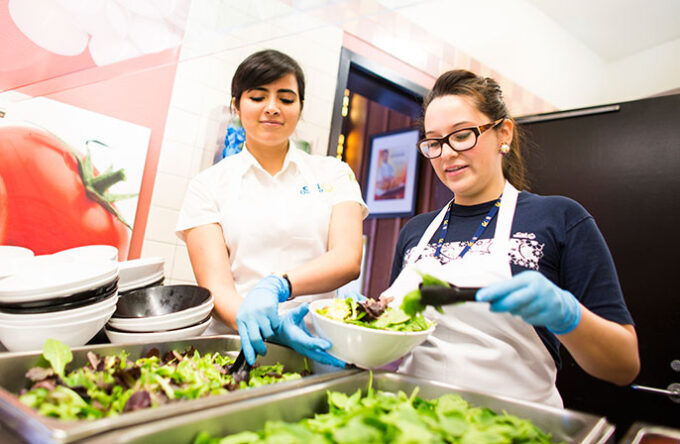Do you run a school and want to provide the best food services for your students? The process of researching, sourcing, and finding a food service company can seem daunting, especially since there is no one-size-fits-all provider that can meet every school’s needs. The good news? With some research on nutrition guidelines and quality standards, you can easily find the best food services for your school. In this blog post, we’ll take a deep dive into the world of school food services, from deciding what kind of food service you need to evaluating vendors and finding the best one for your school’s needs. So sit back, relax, and let’s get cooking on finding the best food service for your school.
According to FoodServicesCompany, FreshPicks Café, Sodexo, Chartwells, Aramark, and Nutrition Inc. are some of the most popular food services companies that serve schools in the U.S. All four have a proven track record of providing healthy and delicious meals to students at institutions of all sizes.
Benefits of Using a School Food Services Company

Source: universityofcalifornia.edu
When it comes to providing meals for students, it is important to weigh the pros and cons before choosing a school food service company. The benefit of using a school food services company is that they provide convenient packaged meals which can save time and money by helping minimize staffing needs and the rising problem of food waste.
Additionally, many school food service companies have tailored offerings based on local guidelines or regulations, making the options more nutritionally balanced with healthier options. For example, some school districts have used outside food service providers to ensure our students receive one vegetarian meal a day that follows USDA nutrition standards.
But there are potential drawbacks as well. For example, when purchasing pre-packaged meals from an outside food service provider like a cafe or catering option, you might not always get the same level of quality or variety in every dish compared to homemade meals prepared fresh in the cafeteria kitchen. This can potentially create a negative experience for students who may be looking for different flavors or textures in their meals that they aren’t able to find in pre-packaged offerings.
The decision to work with a school food services company depends on what works best for your organization’s goals. Regardless of your decision, it is important to remember not all problems will be solved overnight by partnering with an outside vendor. However, having access to nutritionally balanced and appetizing meals can help provide a positive dining experience while still meeting nutritional standards required by local regulations. With this in mind, it’s important to evaluate what solutions best meet the needs of your particular school district as you consider whether working with a school food services company is right for you. Now let’s look at the role of nutrition in developing children’s palates.
Cost-Effective Meal Solutions

Source: simplyrecipes.com
When selecting a school food services company, cost-effectiveness is an important factor to consider. When it comes to meal solutions, the recent trend is to focus on healthy and traditional favorites that can fit budget constraints. Cost-effective options for meals often stems from ingredients that are seasonally available, nutrient-rich and locally sourced. For example, utilizing root vegetables in some form such as potatoes, squash or turnips can provide a more cost-effective option while still offering a nutritious meal choice.
When considering these cost-saving strategies, parents should understand both sides of the argument. On one hand, local farmer’s markets and community gardens may provide reliably fresh produce and additional selection. These vendors may require more planning time and space to store incoming goods; resulting in higher labor costs. Yet they could be more environmentally friendly due to the seasonal produce offered and cutting out transportation costs often associated with ordering from large suppliers or grocery stores.
On the other hand, large suppliers who source their goods from farmers around the country can offer lower prices with the convenience of delivery services. Buying in bulk will generally lead to an overall reduction in cost savings for all participants. Products coming from major suppliers also, at times, may not always adhere to organic and GMO labeling standards, but may still meet nutritional standards set by governing bodies for school lunches and breakfast programs. Nevertheless, price should not be the sole determining factor when deciding which meal solution is best for your needs – nutrition should remain top of mind when creating menus for children on a daily basis.
By carefully considering both options with regards to cost-effectiveness while keeping nutrition as the priority will help you create menu items that appeal to your students’ palates while sticking to your budgetary needs – leading into further important considerations such as any regulations imposed on school food programs.
What types of food and services do school food services companies typically provide?
School food services companies typically provide a variety of food and services tailored to the specific needs of schools. This usually includes breakfast, lunch, snacks, and catering for special events. Depending on the company, menus often include a balanced selection of nutrition-rich meals as well as vegetarian or vegan options. On top of that, many school food service companies provide helpful meal planning guides and nutrition education resources to help maximize their impact. Additionally, these companies often offer comprehensive customer support so that they can more effectively respond to any problems faced by their customers such as staffing shortages or dietary restrictions.
What criteria should I use to evaluate various school food service companies?

Source: theguardian.com
When evaluating school food services companies, it is important to consider a range of factors to ensure you choose the best company for your needs. Firstly, you should look at the company’s track record in providing healthy, nutritious meals that meet school nutrition guidelines and comply with any local regulations. You also want to assess their delivery and customer service. Are they reliable and prompt? Can they accommodate large or sudden orders? Are they willing to go the extra mile to provide something unique or special for a certain event?
Next, you should consider pricing. Are they competitively priced with other companies of the same quality? Is the quality worth the cost? Finally, find out if they offer customization options such as allergen-friendly meals and vegetarian dishes to meet the diverse needs of your school community. Doing some research on schools that have used the company in the past can be helpful when making this decision.
What are the benefits of using a school food services company rather than preparing meals in-house?
The primary benefit of using a school food services company rather than preparing meals in-house is cost savings. Outsourcing meal preparation for a school eliminates the need to hire, train, and manage staff, as well as buy and store supplies. Additionally, school food services companies are skilled professionals with access to high-quality ingredients and equipment to prepare dishes more quickly and tastefully than an in-house team might be able to achieve.
Plus, school food services companies offer greater flexibility than in-house production teams when it comes to menu choices, portion sizes and dietary requirements. In addition, they have the knowledge and experience to help schools meet state or local regulations concerning nutritional content.
Finally, hiring a school food services company ensures that the meals served in cafeterias are consistent throughout the year. With commonly used ingredients and recipes, students can expect flavorful meals every time they enter the cafeteria. This continuity provides a comfortable dining experience and helps keep students coming back for more nutritious options.







